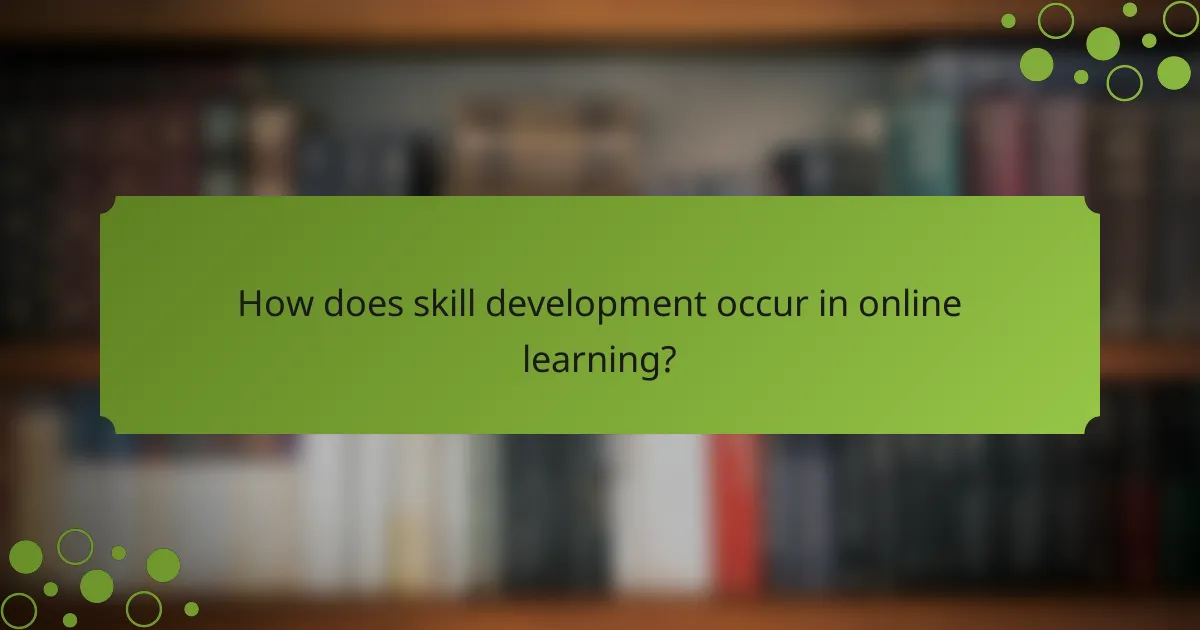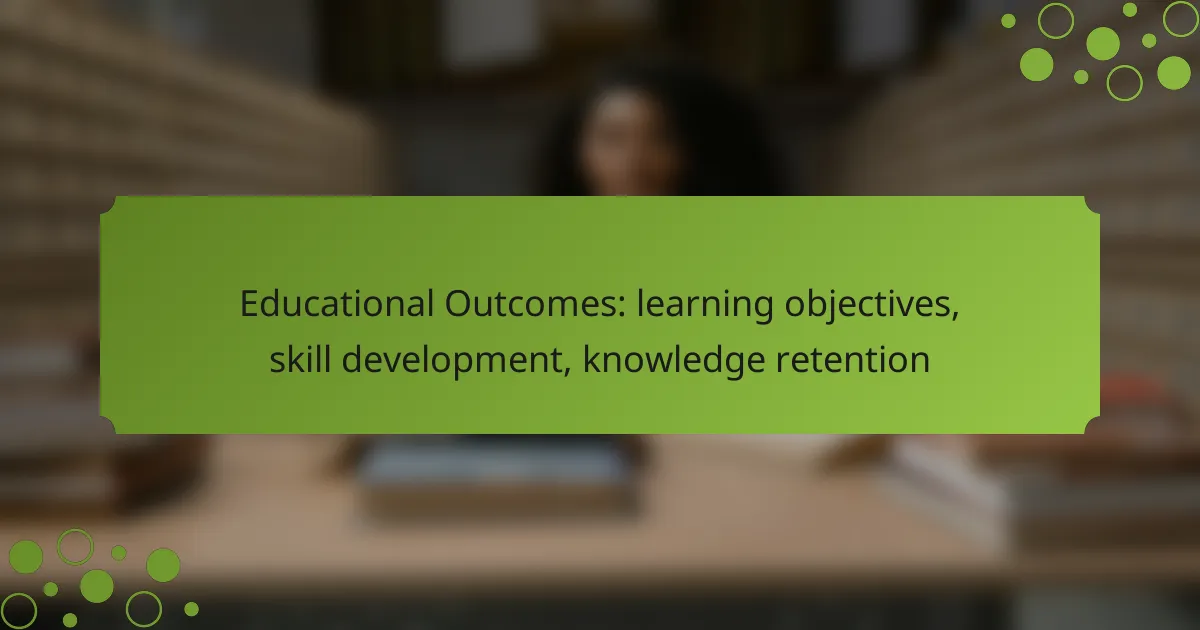Educational outcomes are significantly improved through online courses, which offer flexible and personalized learning environments tailored to individual student needs. By establishing clear learning objectives, these courses ensure that learners understand the expected achievements, while structured activities promote skill development and enhance knowledge retention through practical application and engagement.

How do online courses improve educational outcomes in Australia?
Online courses enhance educational outcomes in Australia by providing flexible learning environments that cater to diverse student needs. They enable personalized learning experiences, allowing students to engage with material at their own pace, which can lead to better understanding and retention of knowledge.
Enhanced learning objectives
Online courses often feature clearly defined learning objectives that guide students through the curriculum. These objectives help learners understand what they are expected to achieve, making it easier to track progress and stay motivated. For instance, a course on digital marketing might outline specific skills like SEO and content creation as key learning goals.
By aligning course content with these objectives, educators can ensure that students acquire relevant knowledge and skills that meet industry standards. This alignment is crucial in fields where practical application is essential, such as healthcare or technology.
Skill development through interactive content
Interactive content, such as quizzes, simulations, and discussion forums, plays a significant role in skill development within online courses. These elements engage students actively, encouraging them to apply what they learn in real-time. For example, a coding bootcamp might include hands-on projects that allow students to practice programming skills immediately.
Additionally, interactive content fosters collaboration among peers, which can enhance learning outcomes. Students can share insights and feedback, creating a richer educational experience that mimics real-world teamwork.
Knowledge retention via assessments
Regular assessments in online courses are vital for reinforcing knowledge retention. Quizzes, assignments, and exams help students review and apply what they have learned, solidifying their understanding of the material. Research indicates that spaced repetition, often used in online assessments, can significantly enhance memory retention.
To maximize retention, educators should design assessments that not only test knowledge but also encourage critical thinking. For example, case studies or problem-solving tasks can challenge students to apply concepts in practical scenarios, further embedding their learning.

What are effective learning objectives for online courses?
Effective learning objectives for online courses clearly define what learners should achieve by the end of the course. These objectives guide course design and assessment, ensuring that both instructors and students understand the expected outcomes.
Specific and measurable goals
Learning objectives should be specific and measurable to provide clear targets for students. For instance, instead of stating “understand basic programming,” a more effective objective would be “write a simple Python program that includes variables and loops.” This clarity helps students focus on tangible skills.
When crafting these goals, consider using the SMART criteria: Specific, Measurable, Achievable, Relevant, and Time-bound. This framework ensures that objectives are not only clear but also realistic and aligned with the course timeline.
Alignment with industry standards
Aligning learning objectives with industry standards ensures that the skills and knowledge gained are relevant and applicable in real-world scenarios. For example, a course in digital marketing should incorporate current practices and tools recognized by industry leaders.
To achieve this alignment, research relevant certifications or frameworks in your field. For instance, if developing a course on project management, consider aligning objectives with the Project Management Institute’s standards. This not only enhances credibility but also increases the employability of students.

How does skill development occur in online learning?
Skill development in online learning occurs through structured activities that promote engagement and practical application of knowledge. This process often involves interactive elements, such as projects and collaborations, which enhance the learning experience and facilitate the retention of skills.
Practical applications through projects
Projects in online learning serve as a vital tool for applying theoretical knowledge to real-world scenarios. These can range from individual assignments to group projects that mimic industry challenges, allowing learners to practice problem-solving and critical thinking.
For instance, a course on digital marketing might require students to create a marketing plan for a hypothetical product. This hands-on approach not only reinforces learning objectives but also helps students build a portfolio that showcases their skills to future employers.
Collaboration with industry professionals
Collaborating with industry professionals in online learning enhances skill development by providing insights into current practices and expectations. Such partnerships can take the form of guest lectures, mentorship programs, or collaborative projects that connect students with experts in their field.
For example, a coding bootcamp might partner with a tech company to offer students the chance to work on a real project under the guidance of experienced developers. This exposure not only improves technical skills but also helps students understand industry standards and networking opportunities.

What strategies enhance knowledge retention in online courses?
Effective strategies for enhancing knowledge retention in online courses include the use of spaced repetition techniques and the incorporation of multimedia resources. These methods help learners reinforce their understanding and recall of material over time.
Use of spaced repetition techniques
Spaced repetition involves reviewing material at increasing intervals, which helps combat forgetting. This technique leverages the psychological spacing effect, allowing learners to retain information more effectively by revisiting concepts just before they are likely to forget them.
To implement spaced repetition, consider using flashcards or digital platforms that automatically schedule reviews based on your performance. Aim for intervals that range from a few days to several weeks, depending on the complexity of the material.
Common pitfalls include cramming information in a short period or failing to revisit concepts regularly. Instead, establish a consistent review schedule to maximize retention.
Incorporation of multimedia resources
Multimedia resources, such as videos, infographics, and interactive simulations, cater to different learning styles and can enhance engagement. These formats can make complex information more digestible and memorable by providing visual and auditory stimuli.
When incorporating multimedia, ensure that it complements the core content rather than distracts from it. For example, use short videos to explain difficult concepts or infographics to summarize key points. Aim for a balance of text and media to maintain learner focus.
Be cautious of overwhelming learners with too much multimedia at once. Instead, introduce resources gradually and provide clear guidance on how to use them effectively in conjunction with the course material.

What criteria should be considered when selecting online courses?
When selecting online courses, consider factors such as course accreditation, instructor qualifications, and the relevance of the curriculum to your learning objectives. These criteria ensure that the course meets educational standards and effectively contributes to skill development and knowledge retention.
Course accreditation and recognition
Course accreditation indicates that the program meets specific educational standards set by recognized organizations. Look for courses accredited by reputable bodies, as this can enhance the value of your credentials in the job market.
Additionally, check if the course is recognized by industry professionals or educational institutions. This recognition can be crucial for career advancement and may impact your ability to transfer credits if you pursue further education.
Instructor qualifications and experience
Instructor qualifications play a vital role in the quality of online courses. Ensure that the instructors have relevant degrees and professional experience in their fields. This expertise can significantly enhance the learning experience and provide practical insights.
Moreover, consider the instructor’s teaching style and feedback from previous students. Look for reviews or ratings that highlight the effectiveness of the instructor in conveying complex concepts and engaging with learners.

How do assessments impact learning outcomes?
Assessments play a crucial role in shaping learning outcomes by providing insights into student understanding and skill acquisition. They help educators identify areas for improvement and adjust teaching strategies accordingly, ultimately enhancing knowledge retention and skill development.
Formative assessments for continuous feedback
Formative assessments are ongoing evaluations that occur during the learning process. They provide immediate feedback to both students and instructors, allowing for timely adjustments in teaching methods and learning strategies. Examples include quizzes, class discussions, and peer reviews.
These assessments help identify gaps in knowledge and understanding, enabling educators to tailor their instruction to meet students’ needs. Regular formative assessments can lead to improved engagement and motivation, as students receive continuous feedback on their progress.
Summative assessments for knowledge evaluation
Summative assessments evaluate student learning at the end of an instructional period, measuring the extent of knowledge retention and skill development. Common forms include final exams, standardized tests, and end-of-term projects. These assessments provide a comprehensive overview of what students have learned.
While summative assessments are essential for gauging overall performance, they can also create pressure for students. It’s important to balance these assessments with formative ones to ensure a well-rounded evaluation of student capabilities. Clear communication about expectations and criteria can help mitigate anxiety and enhance performance.

What emerging trends are shaping online education in Australia?
Emerging trends in online education in Australia are significantly influenced by advancements in technology and evolving learner needs. Key developments include the increased use of artificial intelligence, a focus on personalized learning experiences, and the integration of virtual reality in training programs.
Increased use of artificial intelligence
The use of artificial intelligence (AI) in online education is transforming how students learn and interact with content. AI tools can analyze student performance data to provide tailored feedback and recommendations, enhancing the learning experience.
For instance, AI-driven platforms can adapt course materials based on individual learning paces, helping students grasp concepts more effectively. This personalization can lead to improved engagement and knowledge retention.
Focus on personalized learning experiences
Personalized learning experiences are becoming a cornerstone of online education in Australia. By tailoring educational content to meet the unique needs of each learner, educators can foster better skill development and knowledge retention.
Techniques such as adaptive learning technologies and customized learning paths allow students to progress at their own pace. This approach not only accommodates diverse learning styles but also helps in addressing gaps in knowledge efficiently.
Integration of virtual reality in training
Virtual reality (VR) is increasingly being integrated into online training programs, offering immersive learning experiences that traditional methods cannot match. VR can simulate real-world scenarios, providing students with hands-on practice in a safe environment.
For example, in fields like healthcare or engineering, VR can facilitate realistic simulations that enhance practical skills. This experiential learning can lead to higher retention rates and better preparedness for real-life applications.



